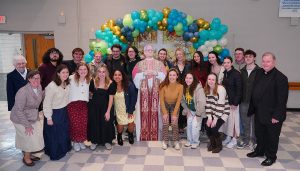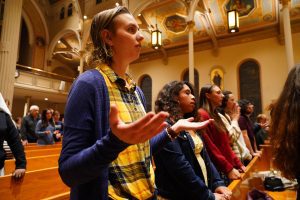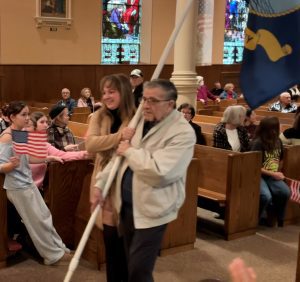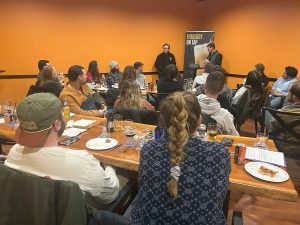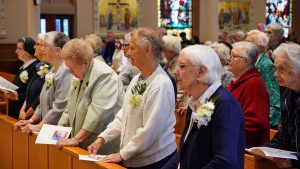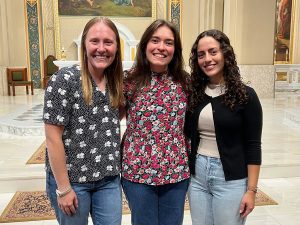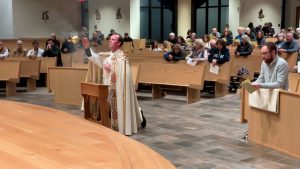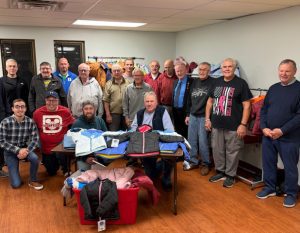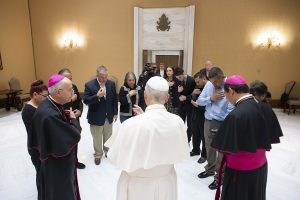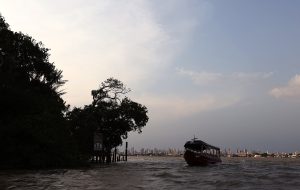EAST STROUDSBURG – On a recent Saturday afternoon, the smell of meatballs and sauce filled the air inside the church hall at Saint Matthew Parish. Conversation and laughter were also heard as people from all walks of life shared a meal together – neighbors, families, and even those experiencing homelessness.
With a similar scene playing out on every Thursday and Saturday – the importance of the parish’s community meal is clear and more important than ever.
For some guests, the meals are a refuge from the streets. For others, they are a cure for loneliness or provide a way to stretch limited budgets as food prices rise.
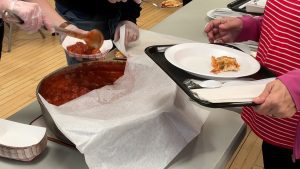
“I’m 81 years old now, and I thought my life would be getting easier as I got older, but it’s not,” Irene Shields, a longtime East Stroudsburg resident who comes to the parish for meals each week, said. “Between the high rent and high food costs, there is no money left for anything.”
Living only a block and a half away from the church, Shields feels loved and cared for by its parishioners.
“It is a great relief to just get out of the house sometimes and then to be fed, I don’t have to cook, I don’t have to clean,” she said.
Saint Matthew Parish has offered a community meal for more than a decade, beginning with a single Saturday dinner, but since the COVID-19 pandemic, the program has expanded to three meals a week, serving more than 14,000 meals each year.
Guests can currently enjoy lunch and dinner on Saturday, as well as a Thursday evening meal.
For Charlie C., who once experienced homelessness, the meal program became a place of stability and even healing.
“In 2015, I lost somebody. She died and I lost my mind for a little while,” he explained. “Being homeless around here, and having places like this to come, it is really great. You can stay here all day. It is really great to have.”
Others, like Patty Hill of East Stroudsburg, relied on the meals as food assistance became harder to access at the beginning of November when SNAP benefit funding issues grabbed headlines.
“We have to rely on the churches and the food pantries for food if we want to survive,” she said.
At the heart of the ministry is Lisa Hoey, the parish’s community meal director, and a team of volunteers who have led the program for years.
“The need for this program continues to grow within the community. It’s not just about the homeless. It’s about families, it’s about the elderly. We see quite a mix here at Saint Matthew’s and we’re very blessed with every one of them,” Hoey said.
On Saturdays, guests are invited to stay the whole afternoon in the church hall – to rest, share fellowship, and even watch a movie between meals.
“They’re able to come in, drop their stuff and sit and socialize,” she added. “They’re not being chased out after they finish a cup of coffee.”
Under Hoey’s direction, teams of volunteers take turns preparing and serving meals each week. Some people cook or bake, while others simply spend time playing cards or talking to guests.
“It’s an incredible group of people. They’re very, very giving of their time and talent,” she explained.
For Father Don Williams, pastor of Saint Matthew Parish, the community meal program is a direct expression of the Gospel in action.
“Nothing that we do upstairs in our beautiful church would make any sense unless we’re connecting it with a life of service,” Father Don said. “Opening our doors to invite the homeless in and members of our community to serve the poor and those who are struggling really gives substance to the Eucharist that we celebrate.”
Father Don said one of the most beautiful parts of the program is seeing both parishioners and those in need come together at the same tables.
“It is a blessing to the parish,” he added. “It’s messy and hard and it’s not always perfect … but everyone is treated with dignity. We welcome each other as Christ.”
Father Brian J.T. Clarke, assistant pastor, added that at the end of the Gospel of Saint Matthew, we hear how God will look at each of us – whether we fed the hungry, clothed the naked and cared for those in need. He said the parishioners of Saint Matthew Parish consistently strive to do that.
“We recognize that times are tough for so many people economically and in their families,” Father Clarke said. “We hope that everyone knows that they can find refuge, warmth, and a nutritious meal here.”

